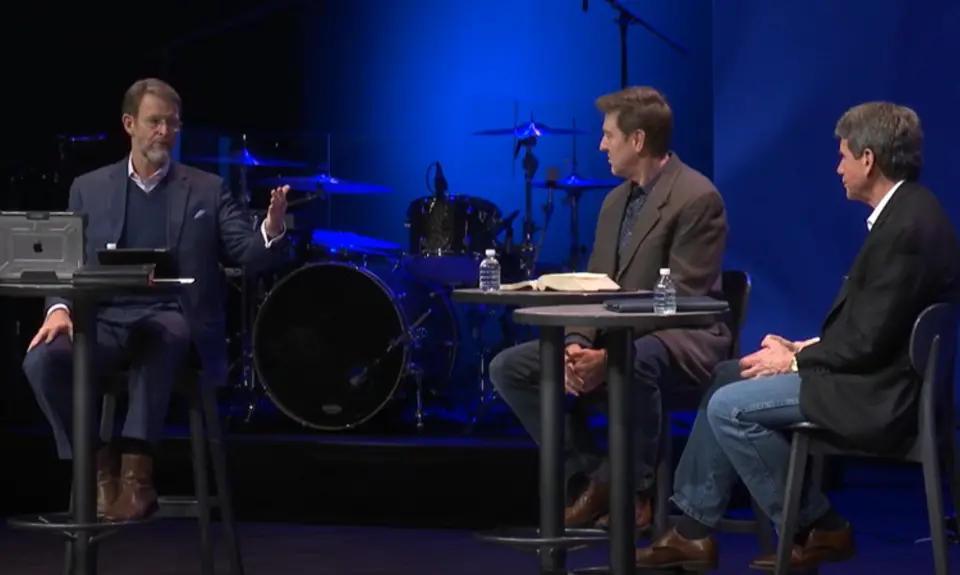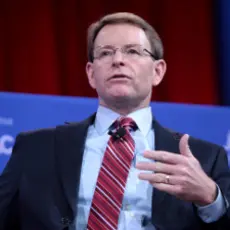Family Research Council President Tony Perkins and Alliance Defending Freedom President Michael Farris encouraged religious-right activists to support new state-level voting restrictions at a Feb. 10 town hall meeting at Cornerstone Chapel, Farris’s home church in Leesburg, Virginia. The event was part of FRC’s “Pray Vote Stand” project.
The program was hosted by Cornerstone Pastor Gary Hamrick, who made a splash just before the 2020 election with a sermon in which he called the election a “spiritual war” and denounced the Democratic Party as evil and demonic. In the week before Election Day, Hamrick’s sermon was distributed widely by former President Donald Trump’s religious-right supporters, including Paula White’s One Voice Prayer Movement and Intercessors for America. White used her position as a White House aide to promote Christian nationalist ideology and denounce Trump’s political opponents as agents of Satan.
At the town hall, Perkins claimed that cable news networks, including Fox News, are “in the tank for the left” and encouraged people to rely on their pastors and groups like FRC and ADF as their sources of information.
In response to a question about protecting the integrity of elections, Farris alleged what he called “constitutional irregularities” in the conduct of the 2020 election—the kind of argument used in the Texas lawsuit that was rejected by the U.S. Supreme Court.
Farris denounced H.R. 1—the For the People Act—as a “horrible” piece of legislation that is “designed to permanently enshrine all the bad things that happened in the last election” and “undermines election integrity in a big way.” He said the bill “must be defeated” and that if it is passed, it must be “challenged at the outset.”
Farris credited “left-leaning” voting rights advocates for having an effective litigation strategy for expanding access to the ballot, which he described as loosening ballot integrity. “Our side, the conservative side of the movement, wasn’t on the field litigating those in a material way,” he said. “We can’t let that happen ever again.”
Farris said there are “a lot of things” Republican state legislators can do—indeed, they have already introduced more than 100 voter suppression bills of various types. Perkins walked through what he called “10 steps to restoring election integrity at the state level,” and suggested that the right voting laws will lead to more Republican victories. His list included:
- Requiring verification of voters’ citizenship, long on the wish-list of voter suppression advocate Kris Kobach.
- Requiring voters to present official, specified forms of identification.
- Limiting absentee or mail-in ballots to “those who are disabled, can’t vote in person, or are going to be out of town.”
- Banning early counting of votes cast before Election Day. Perkins offered no rationale for this one, but it was the refusal of Republican legislators in states like Pennsylvania to allow early counting of mail-in ballots that contributed to delays in counting that allowed Trump to falsely claim victory and charge that election officials were “finding” votes against him.
In response to a question about how activists can oppose marriage equality or Drag Queen Story Hour readings for children at public libraries without coming across as judgmental, Hamrick told people that they should season the truth with grace and love but that they should expect people to be offended by the truth. Farris told the congregation that Hamrick provides them with a good example of “singing the song sweetly,” prompting Hamrick to respond, “Of course, this is the guy that wants me to say really bold political things so he can litigate the Johnson Amendment and get that tossed out.”
The Johnson Amendment, which forbids churches and other tax-exempt nonprofits from engaging in electioneering, has long been resented by religious-right activists, something Trump exploited with his campaign promises to do away with the restriction.
At the town hall, Farris acknowledged that many people in the audience were unhappy about the 2020 election results, and he warned that “there’s gonna be some hard things coming our way.” But, he added, the truth is that “God’s bigger than the giants.” He told people the biggest victory he achieved as head of the Home School Legal Defense Association, which built conservative Christian homeschooling parents into a political force in the GOP, came during the Clinton administration.
Perkins also had words of encouragement about the 2020 elections, noting that the Tea Party reaction against the election of President Barack Obama not only returned Republicans to Congress but resulted in huge Republican gains at the state level that brought about, among other things, the passage of hundreds of anti-choice laws in states across the nation. Farris agreed, saying that we are “very close” to Roe v Wade being, in Perkins’ words, “cast into the dustbin of history.”
Another questioner asked how Christians can prepare for the persecution they claimed is coming, given the “cancel culture,” “the woke movement,” and progressivism. While Hamrick said that he hopes persecution of Christians in the U.S. will not advance to imprisonment or death, people shouldn’t downplay the possibility. Perkins said that persecution could provide “one of the best times for the church in terms of doing our work of evangelism” by providing examples of hope and confidence in troubled times.
Farris encouraged young people interested in the law to go to law school and apply to ADF’s Blackstone fellowship program, which provides “Christian worldview training.” He said “hundreds” of Blackstone graduates have clerked for federal judges, adding that two are now serving as federal appeals court judges and three on state supreme courts.







